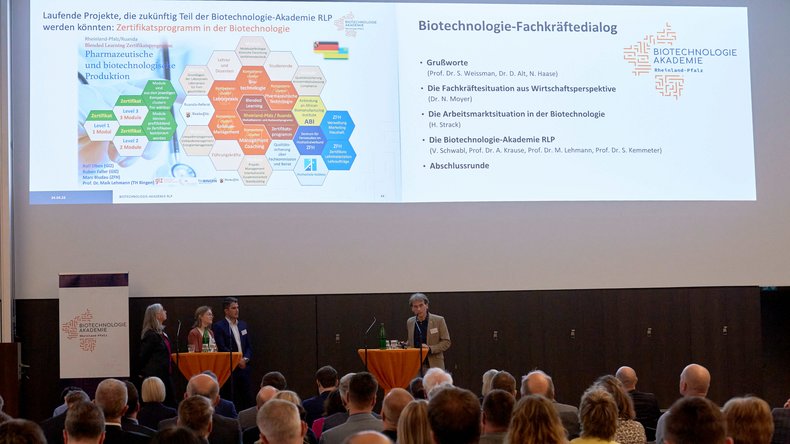The first dialog on skilled professionals of the Biotechnology Academy RLP took place at Mainz University of Applied Sciences in late April. As a networking and communication platform, the academy aims to harness synergies between schools, universities of applied sciences, universities, companies, start-ups, the political sector, associations, and the scientific community, strengthening Rhineland-Palatinate as a biotechnology hub.
The evening event was officially kicked off by Prof. Dr. Antje Krause, President of TH Bingen and Prof. Dr. Susanne Weissman, President of Mainz University of Applied Sciences. In his welcome address, State Secretary Dr. Denis Alt emphasized the importance of Mainz and Rhineland-Palatinate as a biotechnology hub and stressed the need to both retain skilled professionals and recruit new talented individuals. Alt praised the Biotechnology Academy RLP as an important instrument for interlinking science and industry.
In his welcoming remarks, the Mayor of Mainz, Nino Haase, was also enthusiastic about the developments in Mainz as a biotechnology hub, and emphasized the importance of the close ties between science and industry. He praised biotechnology as a “technological leap forward” and emphasized the importance of biotechnology for the local economy as a whole.
The importance of the Rhineland-Palatinate region and current and future challenges were then presented and discussed in high-caliber lectures. The event was moderated by Prof. Jörn Redler, Dean of the School of Business at Mainz University of Applied Sciences.
Dr. Nina Moyer, Head of Human Resources at Schott AG, reported on the key facts and figures of her company and the challenges of the shortage of skilled staff. She outlined that Schott could lose up to 15,000 employees in the next few years as a result of demographic change, and emphasized the need to counteract the shortage of skilled professionals. Heike Strack, Chairwoman of the Management Board, Agentur für Arbeit Mainz, was also able to corroborate this development in her presentation: For example, there are high vacancy rates for jobs in the biotechnology sector, which leads to positions in the chemical and pharmaceutical industries remaining unfilled for an average of 154 days.
The Biotechnology Academy team presented its work and outlined the Academy’s goals and concepts. This initiative, which is supported by the Rhineland-Palatinate Ministry of Health and Science, is based at the TH Bingen and has been under the operational direction of Veronika Schwabl since April. Prof. Dr. Sascha Kemmeter, who holds a professorship in General Business Management and Managerial Accounting at Mainz University of Applied Sciences, also plays a special role at the RLP Biotechnology Academy. Together with professors from other universities in Rhineland-Palatinate, he is actively involved in the establishment and continued development of the Biotechnology Academy, and played a key role in organizing the first dialog on skilled professionals. After Prof. Jörn Redler’s closing questions to the speakers, the inaugural event ended with an informal networking opportunity.
The Biotechnology Academy is an important step towards ensuring and expanding the value chain at the biotechnology hub of Mainz and Rhineland-Palatinate. Since the founding of the Biotechnology Academy RLP, initial concepts and projects have been developed and are now gradually being implemented. As a cross-university platform, the Academy fosters professional exchange through various networking opportunities, thereby facilitating knowledge transfer and access to career, education, and training opportunities in the field of biotechnology. By supporting and connecting educational and research facilities, as well as companies, the Biotechnology Academy RLP significantly contributes to counteracting the prevailing shortage of skilled professionals in biotechnology and consequently to ensuring the future innovative potential of this important industry.



